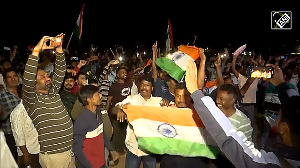 The last Syrian soldiers left Lebanon Tuesday, ending a 29-year military presence, report agencies.
The last Syrian soldiers left Lebanon Tuesday, ending a 29-year military presence, report agencies.
Syrian troops entered the country in 1976 as peacekeepers in the Lebanese civil war, and never left. Their numbers reached a high of 40,000 in 1990, but came down to 14,000 since then.
The Syrian forces ran much of the country's affairs for 29 years, until former Lebanese prime minister Rafik Hariri was assassinated February 14 in a car bombing.
Blaming Damascus for the killing, Lebanese people staged massive demonstrations demanding that the Syrians leave and that top Lebanese security officials, known to be pro-Syrian, resign.
In September, the UN Security Council adopted a resolution calling for the pullout of all foreign forces from Lebanon, and UN Secretary General Kofi Annan has dispatched a team to verify Syria's withdrawal.
In March, a UN report said the Syrian government's "interference" in Lebanese politics was "the primary
Defending the nearly three decade long presence in Lebanon, Syrian army Chief of Staff, Gen. Ali Habib, claimed Lebanon was being left a stronger nation.
Indian among 3 killed in blast near Beirut
"It goes without saying that Syrian armed forces didn't enter Lebanon because they wanted to, but because of a call from the Lebanese government. Syria never had any desires or ambitions in Lebanon except to preserve it's unity," he was quoted as saying.
Speaking a ceremony near the border, Lebanese Army Commander Gen. Michel Suleiman said the two nations will always be linked.
We are "together comrades in arms against Israel ... a cooperative relationship in all areas together." We need to "fend off all sectarianism and divisive forces. Our challenges are one. Our interests are one," he was quoted as saying.
Parliamentary elections in Lebanon are scheduled for May 29.






 © 2025
© 2025